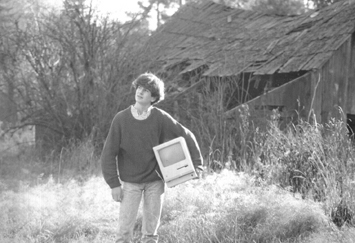Machines of Loving Grace |
 |
| Spring 2008 |
MW 2:00-3:15 |
Room: CSB 632 |
| Instructor: Henry Kautz |
Office: CSB 709 |
Office Hours: Thursdays 10:00am 12:00pm and by appointment |
Description
The combination of widely deployed sensor technology (cameras, RFID, GPS, etc.) and reasoning methods from artificial intelligence enable the creation of systems that monitor many aspects of human behavior. Although monitoring often invokes Orwellian fears, this course will explore positive current and potential applications of such technology to health care, aging in place, and support for persons with disabilities. We will examine the technological underpinnings of automated behavior recognition, social trends that impact and are impacted by the technology, and how the concept of AI-based care giving has appeared in speculative literature. Assignments will include significant writing, and this course It will fulfill one upper-level writing experience in Computer Science. 190 is open to students in all majors with no prerequisites. Computer science majors taking this course as 290 will be required to complete a significant programming project, with the required prerequisite of 172 (Data Structures) and the recommended perquisite of 242 (Artificial Intelligence).
Grading & Assignments
All students will complete three short essays, each about 4 pages long. Students enrolled in 190B will also complete a longer writing project at least 15 pages long. Students enrolled in 290B will also complete three programming assignments. Everyone will be required to make short presentations to the rest of class approximately every other week. In addition, everyone will present a formal 20 minute lecture describing their final writing project or one of programming assignments. Grades for 190B will be calculated 1/3 for the short essays, 1/3 for the presentations, and 1/3 for the final writing project. Grades for 290B will be calculated 1/4 for the essays, 1/4 for the presentations, and 1/2 for the programming assignments. All assignments must be turned in on time. Extensions will be granted only if the student applies to instructor with an acceptable reason at least two days before the assignment is due.
Calendar
- Wed 16 January
- Wed 23 January
- Mon 28 January
- In class exercise: model a navagation-aid robot as a POMDP
- Literary essay due Wednesday
- Wed 30 January
- Slides on SHARP, human activity recognition using RFID tagged objects
- Reading for Monday: Work from PlaceLab at MIT and the Aware Home at Georgia Tech
- Mon 4 February
- Wed 6 February
- Mon 11 February
- Wed 13 February - Class cancelled
- Mon 18 February
- Slides on PEAT, Memex, and SenseCam
- Additional papers for today:
- As We May Think by Vannevar Bush, 1945 (!)
- Jim Gemmell, Gordon Bell and Roger Lueder, MyLifeBits: a personal database for everything
- Sellen, A., Fogg, A., Hodges, S. and Wood, K. Do life-logging technologies support memory for the past? An experimental study using SenseCam. Conference on Human Factors in Computing Systems, CHI ’07, Irvine, CA, (2007), 81-90.
- Wed 20 Feburary
- No lecture; instead, help session on how to complete the programming assignment
- Mon 25 February
- Lecture and demonstration of multi-camera tracking and activity recognition by Sangho Park.
- Wed 27 February
- Paper for today: Opportunity Knocks: a System to Provide Cognitive Assistance with Transportation Services. Donald J. Patterson, Lin Liao, Krzysztof Gajos, Michael Collier, Nik Livic, Katherine Olson, Shiaokai Wang, Dieter Fox, and Henry Kautz. Sixth International Conference on Ubiquitous Computing, Nottingham, England, 2004.
- Mon 3 March
- Wed 5 March
- Topic: Privacy
- Paper: Pervasive Computing, April-June 2002 (Vol. 1, No. 2) pp. 8-12, Pervasive Health Care Applications Face Tough Security Challenges, Vince Stanford
- Slides on Security for Pervasive Health Monitoring Sensor Applications
- Slides on Video Obfuscation . Neustaedter, C., Greenberg, S., and Boyle, M., (2006) Blur Filtration Fails to Preserve Privacy for Home-Based Video Conferencing, In ACM Transactions on Computer Human Interactions (To CHI).
- Slides on Video Inpainting . Heung, S.-C., J. Zhao and M. V. Venkatesh. 2006. Efficient Object-based Video Inpainting. Submitted to IEEE International Conference on Image Processing, ICIP 2006, October 8-11, Atlanta, GA.
- Mon 17 March
- Topic: Autism
- Slides: Autism overview, work by Rosalind Picard, work by Justine Cassell
- Paper: RANA el KALIOUBY, ROSALIND PICARD, SIMON BARON-COHEN (2006) Affective Computing and Autism, Annals of the New York Academy of Sciences 1093 (1) , 228–248
- For more pointers to the work of Prof. Picard and her students at M.I.T.. For more information about her work, see http://affect.media.mit.edu/.
- Paper:
Tartaro, A. and Cassell, J. (in press). Using Virtual Peer Technology as an Intervention for Children with Autism. In J. Lazar (Ed.), Towards Universal Usability: Designing Computer Interfaces for Diverse User Populations. Chichester, UK: John Wiley and Sons.
- Wed 19 March
- Mon 24 March
- Topic: autism, continued
- Paper: Julie A. Kientz, Gillian R. Hayes, Tracy L. Westeyn, Thad Starner, Gregory D. Abowd, "Pervasive Computing and Autism: Assisting Caregivers of Children with Special Needs," IEEE Pervasive Computing ,vol. 6, no. 1, pp. 28-35, January-March, 2007.
- Slides on the work by Abowd et al.
- The ActivityDesigner assignment.
- Wed 26 March
- Mon 31 March
- Wed 2 April
- Mon 7 April
- Wed 9 April
- Mon 14 April
- Demonstration of ActivityDesigner prototypes
- Final assignment, due April 30th:
- Wed 16 April: CLASS CANCELLED
- Mon 21 April
- Lecture: Neurorobotics video clips: Aliens_Loader_5000.mpg monkey_arm.arvi monkey_walks.avi
- Dellon, B.T.; Matsuoka, Y. “Robotic Systems for Rehabilitation, Exoskeleton, and Prosthetics: Now and for the Future,” IEEE Robotics and Automation Society Magazine, 14(1), pp.30 – 34, 2007.
- Brain Machine Interfaces: Past, Present and Future: Lebedev MA and Nicolelis MAL. Trends in Neurosciences 29: 536-546, 2006.
- Wed 23 April
- Mon 28 April
- Google, Microsoft, and the Future of Medical Informatics
- Wed 30 April
- Final assignments due
- Presentations of final assignments

